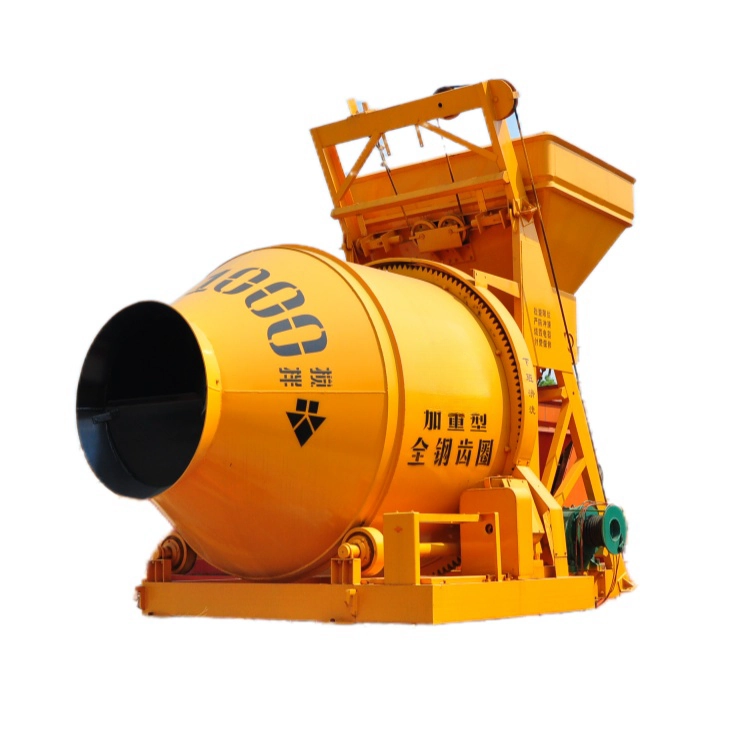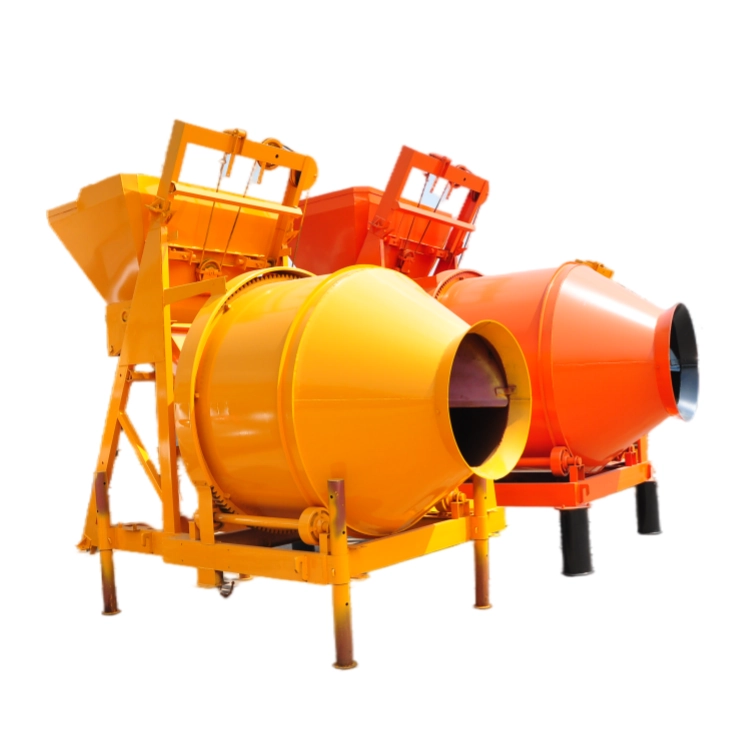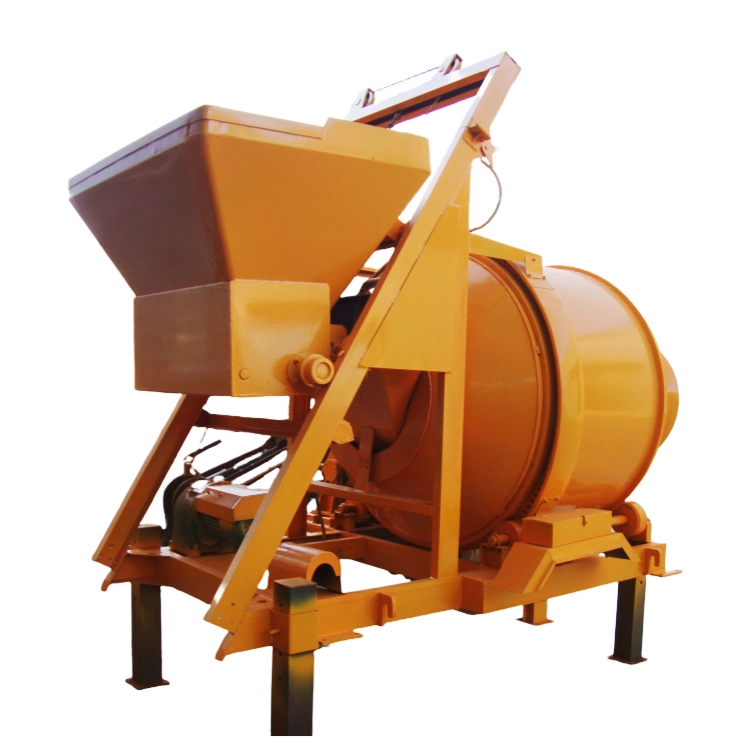
Portable Concrete Mixer
Portable Electric Concrete Mixer Machine for Cement Mixing
Item Number : JZC350
Price varies based on specs and customizations
- Discharge capacity(L)
- 350
- Dimensions (mm)
- 2766×2140×3000
- Productivity(m³/h)
- 10-14
Shipping:
Contact us to get shipping details Enjoy On-time Dispatch Guarantee.
Why Choose Us
Easy ordering process, quality products, and dedicated support for your business success.

Application
The electric cement mixer is an essential tool for a wide range of construction and concrete-related tasks. Its versatility makes it suitable for various applications, including small to medium-sized construction projects, road and bridge construction, and water and electricity infrastructure development. This portable concrete mixer is particularly beneficial for concrete component factories that require consistent and high-quality mixing of materials. Whether you're working on a residential building site or a commercial project, this machine ensures efficient and reliable concrete mixing. Its adaptability extends to different types of concrete, including plastic and semi-dry hard concrete, making it a valuable asset for contractors and builders. Additionally, the electric cement mixer is ideal for projects that demand mobility, as it can be easily transported to different locations thanks to its movable tires and traction capabilities.
Feature
The electric cement mixer boasts a range of features designed to enhance performance and user convenience. Key features include:
- Reliable Transmission: Ensures consistent and smooth operation, reducing the risk of breakdowns.
- Low Noise Operation: Minimizes noise pollution, making it suitable for urban and residential areas.
- Energy Efficiency: Consumes less power, reducing operational costs and environmental impact.
- Compact Design: Saves space and allows for easy maneuverability on job sites.
- Smooth Rotation: Provides even mixing of concrete, ensuring high-quality output.
- User-Friendly Operation: Simple controls make it easy for operators of all skill levels to use.
- Dual Rotation Modes: Forward rotation for mixing and reverse rotation for efficient discharge of concrete.
- Customizable Options: Available in different feeding types (tipping bucket and climbing bucket) and power sources (electric or diesel) to meet specific project needs.

Principle
The electric cement mixer operates on a straightforward yet effective principle. The drum of the mixer is rotated by a gear ring, which ensures precise and controlled movement. During the mixing process, the drum rotates forward, allowing the ingredients to blend thoroughly and achieve the desired consistency. Once the mixing is complete, the drum can be reversed to discharge the concrete quickly and efficiently. This dual rotation mechanism not only enhances the mixing quality but also speeds up the overall process. The mixer is designed to handle various types of concrete, including plastic and semi-dry hard concrete, making it a versatile tool for different construction needs. The integration of movable tires and traction capabilities further enhances its functionality by allowing easy transportation between job sites.
Advantage
The electric cement mixer offers numerous advantages that make it a preferred choice for construction professionals. Key benefits include:
- High Productivity: Efficient mixing and discharge processes result in faster project completion times.
- Superior Mixing Quality: Ensures uniform consistency and strength of the concrete, leading to better construction outcomes.
- Portability: Equipped with movable tires and traction, allowing for easy relocation across different job sites.
- Cost-Effective: Low energy consumption and minimal maintenance requirements reduce operational costs.
- Versatility: Suitable for a wide range of applications and capable of handling different types of concrete.
- Customization Options: Available in various configurations to meet specific project requirements.
- Durability: Built with robust materials to withstand the rigors of construction environments.
- Ease of Use: User-friendly controls and smooth operation make it accessible to operators of all experience levels.
These advantages collectively contribute to the electric cement mixer's reputation as a reliable, efficient, and versatile tool for modern construction projects.

Technical specifications
| Parameter | Specification |
|---|---|
| Model | JZC350 |
| Type | Drum Mixer |
| Rotation Mechanism | Gear Ring |
| Rotation Modes | Forward (Mixing), Reverse (Discharge) |
| Mixing Capability | Plastic and Semi-Dry Hard Concrete |
| Feeding Types | Tipping Bucket, Climbing Bucket |
| Power Options | Electric, Diesel |
| Mobility | Equipped with Movable Tires and Traction |
| Applications | Construction Sites, Roads, Bridges, Water and Electricity, Small and Medium-Sized Concrete Component Factories |
| Advantages | Reliable Transmission, Low Noise, Low Energy Consumption, Compact Structure, Smooth Operation, Convenient Operation, Good Mixing Quality, High Productivity |
FAQ
What Are The Common Applications Of Portable Cement Mixers?
What Is A Mobile Concrete Mixer?
What Is A Mini Cement Mixer Used For?
What Are The Main Applications Of Concrete Mixers?
What Are The Main Applications Of Mixing Concrete Mixers?
What Are The Applications Of A Skid Steer Cement Mixer?
What Are The Applications Of A Cement Mixer With Lift?
What Are The Main Applications Of Mud Mixer Cement Mixers?
What Are The Main Applications Of Hydraulic Concrete Mixers?
What Are The Main Applications Of Cement Mixing Plants?
What Is The Principle Of A Construction Mixer Machine?
What Are The Benefits Of Using A Portable Cement Mixer?
What Are The Main Applications Of A Mobile Concrete Mixer?
What Are The Key Benefits Of Using A Mini Cement Mixer?
What Are The Different Types Of Concrete Mixers Available?
What Are The Key Features Of A Mixing Concrete Mixer?
What Features Should I Look For In A High-quality Skid Steer Cement Mixer?
How Does A Cement Mixer With Lift Work?
What Are The Main Components Of A Cement Mixer?
What Are The Key Features Of Hydraulic Concrete Mixers?
What Are The Key Features Of Commercial Concrete Mixing Plants?
What Are The Advantages Of Using A Construction Mixer Machine?
What Features Should I Look For In A Portable Cement Mixer?
How Does A Mobile Concrete Mixer Work?
What Materials Can A Mini Cement Mixer Handle?
How Does A Concrete Mixer Work?
How Does A Batch Mixer Work?
What Is The Principle Behind A Skid Steer Cement Mixer?
What Are The Advantages Of Using A Cement Mixer With Lift?
What Are The Advantages Of Using A Cement Mixer?
How Does A Hydraulic Concrete Mixer Work?
What Are The Advantages Of Using A Cement Mortar Mixing Plant?
What Are The Common Applications Of Construction Mixer Machines?
What Are Some Tips For Using A Portable Cement Mixer Effectively?
What Are The Advantages Of Using A Mobile Concrete Mixer?
How Does A Mini Cement Mixer Work?
What Are The Advantages Of Using A Concrete Mixer?
What Is The Principle Behind A Volumetric Concrete Mixer?
What Are The Advantages Of Using A Skid Steer Cement Mixer?
Can A Cement Mixer With Lift Be Used For Purposes Other Than Mixing Cement?
What Types Of Cement Mixers Are Available?
What Are The Advantages Of Using Hydraulic Concrete Mixers?
How Does A Cement Mixing Plant Work?
What Types Of Construction Mixer Machines Are Available?
What Are The Advantages Of Owning A Portable Cement Mixer?
What Types Of Projects Are Best Suited For Mobile Concrete Mixers?
What Are The Advantages Of Owning A Portable Mini Cement Mixer?
What Should I Consider When Choosing A Concrete Mixer?
What Are The Advantages Of Using A Mixing Concrete Mixer?
Why Is A Skid Steer Cement Mixer Suitable For Tight Workspaces?
Why Is A Cement Mixer With Lift Beneficial For Construction Sites?
How Does A Cement Mixer Work?
What Types Of Projects Are Hydraulic Concrete Mixers Suitable For?
What Components Are Typically Included In A Cement Mixing Plant Setup?
How Does A Construction Mixer Machine Improve Construction Efficiency?
What Types Of Materials Can A Portable Cement Mixer Handle?
How Does A Mobile Concrete Mixer Improve Efficiency?
Are Mini Cement Mixers Cost-effective?
Are There Portable Concrete Mixers Available?
How Does A Concrete Mixer Benefit The Environment?
What Should I Consider When Choosing A Cement Mixer?
What Types Of Projects Are Cement Mixing Plants Ideal For?
How Does A Portable Cement Mixer Save Time?
What Features Should I Look For In A Mobile Concrete Mixer?
Can Mini Cement Mixers Be Transported Easily?
What Is The Capacity Range Of Concrete Mixers?
What Types Of Projects Are Portable Concrete Mixers Suitable For?
Are Cement Mixers Suitable For DIY Projects?
What Are The Environmental Benefits Of Using A Cement Mixing Plant?
Why Is Portability An Important Feature In Cement Mixers?
Are Mobile Concrete Mixers Cost-effective?
How Does A Mini Cement Mixer Improve Work Efficiency?
Can Concrete Mixers Be Used For Other Materials Besides Concrete?
What Should I Consider When Choosing A Concrete Mixer For Large-scale Projects?
Can Cement Mixers Handle Different Types Of Concrete Mixes?
How Does A Cement Mixing Plant Ensure High-quality Concrete Production?
What Should I Consider When Choosing The Capacity Of A Portable Cement Mixer?
What Maintenance Is Required For A Concrete Mixer?
What Maintenance Is Required For A Cement Mixer?
What Makes Cement Mixing Plants Cost-effective?
How Does A Portable Cement Mixer Enhance Cost-effectiveness?
Are There Eco-friendly Concrete Mixers Available?
How Do I Ensure Safety When Using A Cement Mixer?
Are Cement Mixing Plants Easy To Transport And Set Up?
4.8 / 5
This mixer is a game-changer! Super efficient and easy to use. Perfect for small projects.
4.7 / 5
Excellent value for money. The mixer is sturdy and delivers consistent results every time.
4.9 / 5
I’m impressed with the quality and durability. It’s lightweight yet powerful. Highly recommend!
4.8 / 5
Fast delivery and top-notch performance. This mixer has made my work so much easier.
4.9 / 5
Incredibly reliable and efficient. The portability is a huge plus for on-site jobs.
4.7 / 5
Great investment! The mixer is well-built and handles heavy-duty tasks effortlessly.
4.8 / 5
The mixer is compact yet powerful. It’s perfect for both small and medium-scale projects.
4.9 / 5
Amazing product! It’s easy to operate and delivers professional-grade results.
4.8 / 5
Highly efficient and durable. This mixer has exceeded my expectations in every way.
4.9 / 5
The mixer is a lifesaver! It’s portable, powerful, and incredibly easy to maintain.
4.7 / 5
Fantastic product! The mixer is reliable and perfect for any construction project.
4.8 / 5
I love how compact and efficient this mixer is. It’s a must-have for DIY enthusiasts.
4.9 / 5
Outstanding performance! The mixer is robust and delivers smooth, consistent mixing.
4.8 / 5
This mixer is worth every penny. It’s durable, efficient, and incredibly easy to use.
4.7 / 5
Great product! The mixer is lightweight yet powerful, perfect for on-the-go projects.
4.9 / 5
Highly recommend this mixer! It’s reliable, efficient, and built to last.
4.8 / 5
Excellent mixer! It’s compact, powerful, and perfect for any construction job.
4.9 / 5
This mixer is a dream! It’s portable, efficient, and delivers professional results.
4.8 / 5
Fantastic investment! The mixer is sturdy, reliable, and perfect for any project.
REQUEST A QUOTE
Our professional team will reply to you within one business day. Please feel free to contact us!
Related Products

Portable Electric Small Cement Mixer Concrete Machine
Portable cement mixer for construction, roads, and DIY. High performance, easy operation, and durable design.

JDY350 Electric Hydraulic Mortar Mud Concrete Mixer
Discover the electric mortar mixer for construction, road, and water projects. High efficiency, safe operation, versatile mixing. Explore now!

JDC350 Small Cement Concrete Mortar Mixer
Discover the JDC350 small cement mixer for efficient, uniform concrete mixing in construction, roads, and water projects. Boost productivity and quality today.

JZC400 Mobile Small Concrete Mixer Cement Mixer Machine
Discover the JZC400 concrete mixer, ideal for small to medium projects. Durable, efficient, and versatile. Perfect for construction sites. Explore now!

JZC1000 Industrial Concrete Mixer Machine Cement Mixer Price
Discover the high-performance concrete mixer for construction sites, road projects, and factories. Features 1600L feeding, 1000L discharge, and precise mixing. Enhance efficiency today!

Concrete Cement Mixer Machine Drum Mixer for Construction
Discover the high-efficiency cement mixer for construction, manufacturing, and more. Global availability, certified quality, and 1-year warranty.

JS500 Electric Cement Concrete Mixer for Sale
Electric cement mixer for construction: high-efficiency, durable, and versatile. Achieve uniform mixing with advanced twin-shaft technology. Certified quality.

Commercial Electric Concrete Mixer Machine HZS 50 Small Batch Plant for Sale
Discover high-quality concrete mixer machines and batch plants for construction, road, and precast projects. Efficient, precise, and user-friendly.

Skid Steer Self Loading Concrete Mixers for Construction
Discover high-efficiency concrete mixers for construction projects. Durable, versatile, and easy to operate. Boost productivity now!

HZS25 Best Cement Mixer for Quick Mix Concrete at Bunnings
Discover the best cement mixer for small to medium construction projects. High productivity, precise batching, compact design. Ideal for versatile applications.

Harbor Freight JS1500 On Site Concrete Mixing Volumetric Cement Mixer
Discover the JS1500 harbor freight cement mixer for large-scale construction and hydraulic projects. High-capacity, efficient, and eco-friendly.

JS1000 Volumetric Concrete Mortar Mixer for Sale Skid Steer Cement Mixer
Discover the JS1000 volumetric concrete mixer, ideal for building, road, and hydropower projects. High efficiency, reliable performance, and easy maintenance ensure consistent, quality concrete.

JZC500 Large Cement Mixer Machine Price for Concrete Mix
Explore the JZC500 large cement mixer for efficient, portable, and durable concrete mixing on construction sites. Boost productivity now!

Belle Cement Mixer JS2000 Volumetric Concrete Mixer for Harbor Freight
Discover the Belle cement mixer for high-quality concrete production. Ideal for large-scale construction, transportation, and energy projects. Reliable, precise, and easy to maintain.

HZS75 Concrete Batching Plant Cement Mixer Price Concrete Mixer Bunnings Mixing Plant
Optimize your construction projects with the HZS75 concrete batching plant—high efficiency, precise mixing, and automated control for superior results.

HZS90 Large Multiquip Concrete Mixers for Construction
Discover the HZS90 concrete mixer, ideal for large-scale construction, road, and hydropower projects. High efficiency, precise mixing, and easy installation. Learn more now!

HZS180 Ready Mix Concrete Plant for Foundations with Sand and Cement
Optimize your construction projects with our ready mix concrete plant. High efficiency, precise measurement, and advanced automation ensure top-quality concrete for large-scale builds. Explore now!
Related Articles

How to Repurpose Cement Mixers for High-Efficiency Farm Material Processing
Learn how to repurpose cement mixers for efficient farm material processing, from compost blending to fertilizer treatment, saving costs and boosting productivity.

How to Transform Your Cement Mixer into a High-Performance Art Tool
Transform your cement mixer into a high-performance art tool for sculptures, glass tumbling, and durable gallery pieces with these expert tips.

How Component Engineering Elevates Cement Mixer Performance for Small Projects
Discover how component engineering enhances cement mixer efficiency, lifespan, and suitability for small projects. Learn key features for optimal performance.

Cement Mixer Hacks: When Innovation Meets Industrial Reality
Cement mixer hacks: why viral stunts like mixing food in industrial equipment are risky and impractical. Learn safer alternatives.

How to Repurpose Your Cement Mixer for Ammunition, Farming, and DIY Projects
Repurpose your cement mixer for ammo reloading, farming, and DIY projects. Save money and boost efficiency with these versatile techniques.

How Cement Mixers Solve Industrial Derusting Challenges Safely and Efficiently
Discover how cement mixers can be repurposed for safe, cost-effective industrial derusting with proven methods and safety tips.

How Small Cement Mixers Cut Labor Costs and Boost Project Value
Discover how small cement mixers reduce labor costs, boost efficiency, and save money on concrete projects with automated mixing solutions.

How Small Cement Mixers Prevent Chronic Injuries in Construction Workers
Small cement mixers prevent chronic injuries in construction workers by reducing biomechanical strain. Learn how ergonomic designs improve health and efficiency.

How to Install Cement Silos Safely: 3 Critical Phases for Compliance and Durability
Learn the 3 critical phases of cement silo installation for compliance & durability—foundation prep, precision erection, and safety checks.

How to Prevent Cement Silo Degradation: 3 Proven Strategies for Uninterrupted Production
Learn 3 proven strategies to prevent cement silo degradation, including residue control, corrosion prevention, and IoT monitoring for uninterrupted production.

How to Prevent Cement Silo Caking: Science-Backed Strategies for Maintenance Teams
Learn science-backed strategies to prevent cement silo caking, reduce downtime, and maintain material quality with moisture control and modern tools.

How to Prevent Cement Silo Air Path Failures Through Smart Filter Maintenance
Learn proactive filter maintenance to prevent cement silo air path failures, reduce downtime, and extend equipment lifespan.